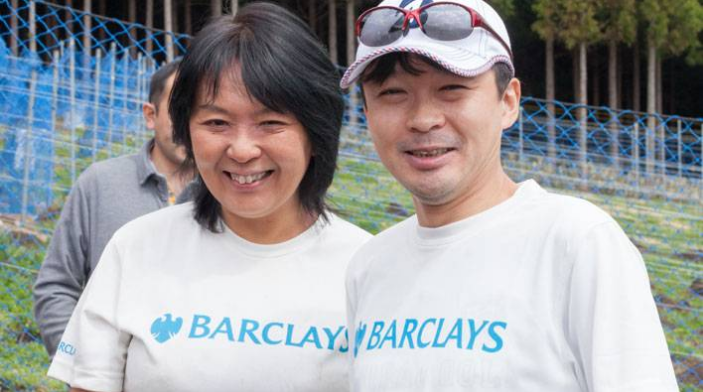In the World: Supporting Survivors of the Japanese Earthquake
by Keita Era
Originally published on Barclays
I joined Barclays in 2010 on their graduate scheme and now work in the Tokyo office as an Analyst. My job is to support our sales team who mainly deal with structured Barclays products.
I first started volunteering after the Tohoku disaster in 2011, when my colleagues and I organised a trip to Otsuchi town to help with the relief effort. Although there were many people who wanted to assist, at the time there was not a lot of organised support.
It was there that I first came across the Tono Magokoro Network, an organisation dedicated to helping those affected by the disaster. In the first year after the tsunami we were visiting Otsuchi town once a month, as much aid was needed.
The project’s current focus is to build a vineyard that provides vital jobs for local people. It is a complicated process which involves both laying trees and farming grapes, so that the community can produce local wines and sell them to the world. We are aiming to be able to sell our stock during the Japan Rugby World Cup in 2019, which takes place just before the Tokyo Olympics.
Another important aim is to be able to provide sustainable jobs at the vineyards for those with disabilities. After the earthquake, Kamaishi City had the highest disability rate in Japan, with around 2,500 people affected by mental or physical problems. It can be difficult for those with disabilities to earn a living in Japan and government support is limited. We are proud that our project has enabled the employees to earn approximately £1,500 a month, so that they are able to support themselves.
There are many challenges when working on a project that supplies relief on such a large scale. Initially, after the earthquake, the local community did not particularly trust outsiders. We have had to slowly build that trust over the years, by regular visiting and helping to rebuild the city.
The work can also be difficult emotionally. After the disaster we were responsible for collecting photos that had been found on the ground, cleaning them, and returning them to their owners. Of course it was fantastic to unite people with their valued possessions, but it was also quite an upsetting experience.
It’s very fulfilling working with the Tono Magokoro Project and I’ve heard a great deal of inspiring stories. After the disaster we had to dig out the entire beach in Otsuchi Town, removing all the furniture, bins and glass that had ended up there after the earthquake. Physically it was a really tough task and it took a lot of us to complete. After we had finished the job there was a festival on the beach, attended by the local community. It was a wonderful event, which finished up with fireworks. By the end some people were so happy they were in tears. It was a very touching moment.
What I enjoy most about working with the Tono Magokoro Network is that it gives me an opportunity to interact and help those who are in need. I enjoy building relationships with the local people we work with, by going for dinner and sharing stories.
Volunteering has also helped improve my communication skills. As an experienced volunteer, having visited Otsuchi and Kamaishi over 30 times, I take a leadership role and help guide others. When managing the project, I have to liaise with a lot of people from different backgrounds. Enhancing these skills is something that has proved valuable in my day-to-day work with Barclays.
I’ve been really impressed with the way that Barclays has supported the project. Initially my colleagues and I were self-funding our trips, but since Barclays got involved they have covered the costs and donated much needed funds which we use to buy vital equipment and supplies.
I’ve thoroughly enjoyed my time working with The Tono Magokoro Network. It’s amazing the difference our hard work has made to the lives of so many others.




